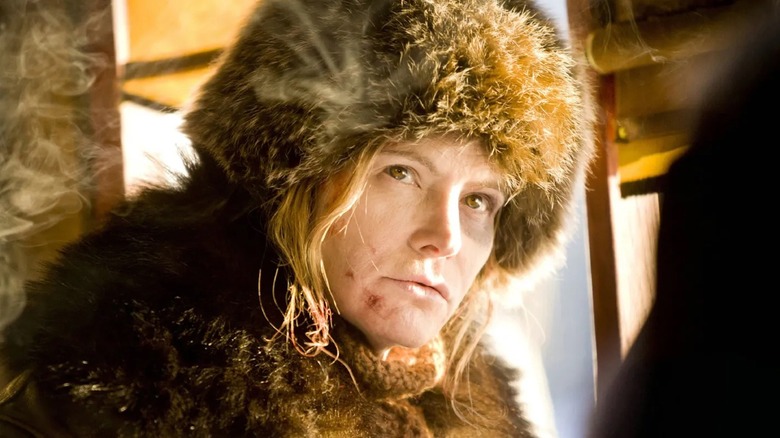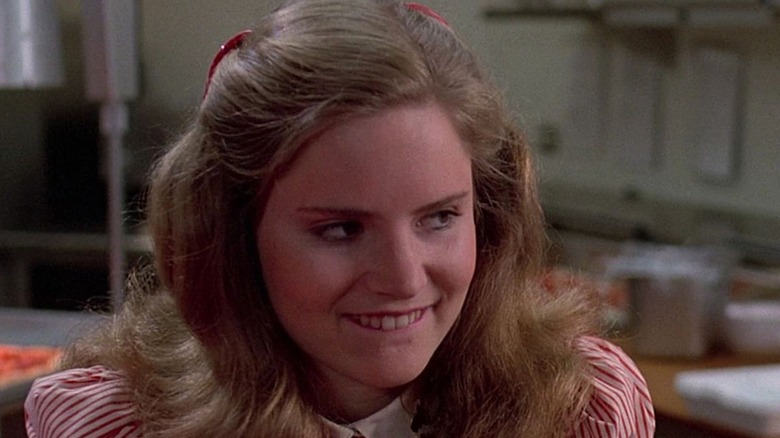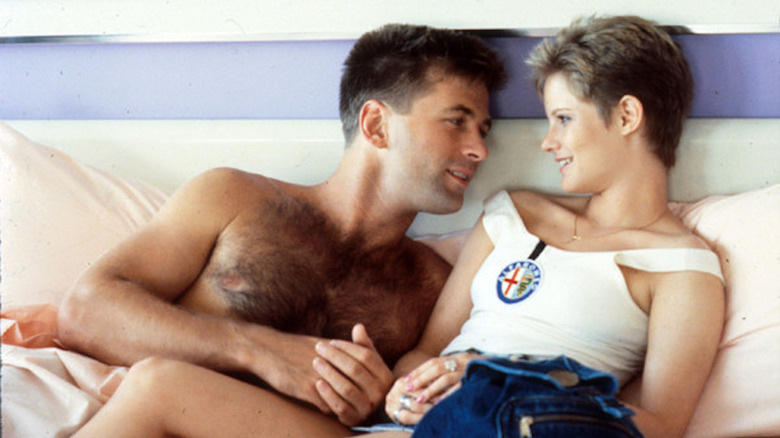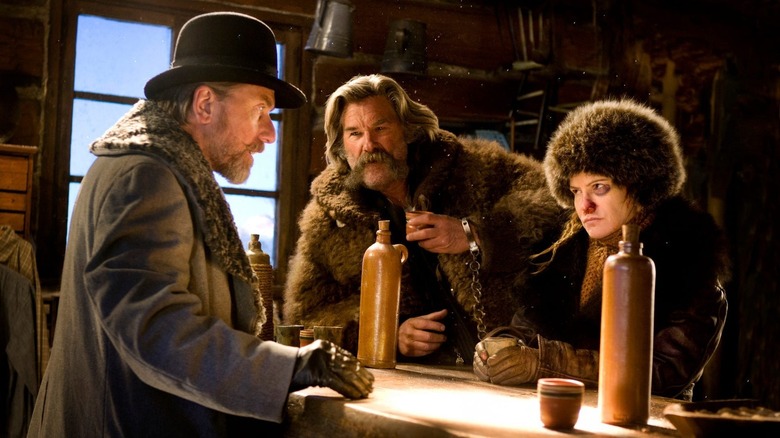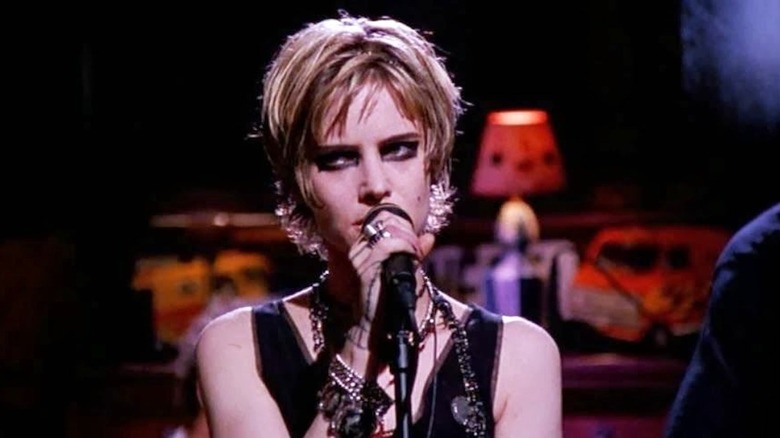Jennifer Jason Leigh Is The Best Actor Ever
(Welcome to Best Actor Ever, an ongoing series where we explore the careers and performances of the greatest performers to ever grace the screen.)
There is not an actor in the history of moving pictures who has been more egregiously taken for granted by her industry than Jennifer Jason Leigh.
Critics have always had her back. The New York Times' Janet Maslin got it from the jump when she singled Leigh out as "the only thing worth seeing" in her film debut "Eyes of a Stranger." The better-than-average 1981 slasher film set the tone for Leigh's career in that she plays a victim. Her character is a blind-deaf mute whose condition was brought on by being kidnapped and raped at an early age. The 19-year-old Leigh projects sweetness and innocence, but this young woman is all serrated edges. Because she isn't just a victim. She's a survivor.
Roger Ebert was also an early admirer of Leigh, to the extent that he turned his one-star review of "Fast Times at Ridgemont High" into a wildly indignant scolding of Amy Heckerling and Cameron Crowe. He was outraged that they would subject this guileless creature to the virginity-shredding cruelties of a U.S. high school. Ebert's ire was unwarranted, but I understand this defensive impulse on behalf of Ms. Leigh. Her Stacy Hamilton is a meekly curious high-schooler who's surprised to discover she's become desirable, and it's only natural that she wants to take this newfound attractiveness out for a spin. That it all goes horribly wrong isn't Heckerling and Crowe's fault. It's society's. "Fast Times at Ridgemont High" signaled a shake-up in studio filmmaking, and Leigh is a huge reason why.
Leigh's 42-year career is a harrowing road map of mistakes and mistreatment. She's played characters who have it all together, but those feel like exhales, a break from her dogged exploration of miserables. She's good in everything, but she's vital for her dissonance. People like to call this bravery, but it's really an act of unvarnished honesty.
The breakout
We're just getting to know Jennifer Jason Leigh's Stacy Hamilton in "Fast Times at Ridgemont High" when she's hit on by an older man while waiting tables at Perry's Pizza. She's flattered and nervous. He asks her out, and she shyly acquiesces. Stacy seeks the counsel of her more experienced coworker Linda (Phoebe Cates), who encourages her to follow through and, if it comes to this, lose her virginity. Of course it comes to this, in hideously unglamorous fashion at "The Point," a baseball field dugout; as Stacy's date thrusts away, she grimaces and stares at the random graffiti scrawled on the ceiling. "Surf Nazis." "Disco F**s." Stacy will never unsee these spray-painted missives.
This is the cheapness of innocence writ painfully small, and Leigh gets the worst of it at every turn. She's receptive to the puppy-dog crush of Brian Backer's Mark Ratner, but he lacks confidence. Stacy's made her move; when is he going to make his? An impatient Stacy settles for clumsy sex with Mark's ticket-scalping friend Damone (Robert Romanus) and winds up pregnant. He bails on her abortion, but she follows through with unintended assistance from her brother Brad (Judge Reinhold).
Roger Ebert viewed this as gross mistreatment of a fine actor, but outside of Sidney Flanigan's performance in Eliza Hittman's 2020 masterpiece "Never Rarely Sometimes Always," I can't think of a more piercing portrayal of young womanhood in the U.S. It hurts because it's Leigh. Stacy's navigating the choppy waters of her sexual awakening, and receiving advanced advice from a more worldly friend. Leigh's Stacy is adrift in a world that views her as a good girl or a trophy. She can't grasp this, and we're aggrieved on her behalf. It's a bravura coming-of-age portrayal and an indictment of how we raise our kids. Boys will be boys, and girls will be prey.
The career
Jennifer Jason Leigh was a critical darling coming off "Fast Times at Ridgemont High," but she still had to scrap for roles. She brought uncommon nuance to her portrayals of victims in Paul Verhoeven's "Flesh + Blood," Robert Harmon's "The Hitcher," and Peter Medak's "The Men's Club," but where were the leads? She's superb in Matthew Chapman's little-seen S&M thriller "Heart of Midnight," and adorable as Kevin Bacon's experimental filmmaker buddy in Christopher Guest's "The Big Picture," but we didn't get to see Leigh cut loose until Uli Edel's scathing adaptation of Hubert Selby Jr.'s "Last Exit to Brooklyn." As love-lorn sex worker Tralala, Leigh apotheosized the tragic sexuality of her previous roles. She drives men wild, and this drives her more than a little wild too.
She downshifted to object of psychotic desire in George Armitage's "Miami Blues" as a sex worker who buys into the threadbare lie of Alec Baldwin's straight-up killer because he was the only man who was ever kind to her. Leigh finally got a meaty lead role in Lili Fini Zanuck's "Rush," where she circles the drain as an undercover narcotics officer opposite an equally intense Jason Patric. This became the norm for Leigh. If you wanted her in your movie, you better have a seriously f***ed up character for her to inhabit.
There's been some lightness between now and the present. I love her Rosalind Russell tribute in the Coen Brothers' "The Hudsucker Proxy," but that wound up being a dress rehearsal for her dour take on Dorothy Parker in Alan Parker's "Mrs. Parker and the Vicious Circle." If Leigh's having fun, there's a downer payoff coming down the pike. It's hardly surprising a miserablist like Charlie Kaufman hooked up with her for two deeply depressing films ("Synecdoche, New York" and "Anomalisa").
The Career Part II
It's also not shocking, sadly, that the Academy of Motion Picture Arts and Sciences didn't get around to nominating her for an Oscar until Quentin Tarantino's 2015 thriller "The Hateful Eight." As condemned woman Daisy Domergue, Jennifer Jason Leigh is a snarling, tooth-spitting force of misanthropic nature. The more violence that's visited on Daisy (and her already rough visage gets pulverized into hamburger by the film's conclusion), the more vicious she becomes. Daisy is the defiant, spiritual entanglement of every character she's ever played. She's been wronged in so many despicable ways that her only recourse is to return the pain tenfold. "Crazy" Daisy has a right to be hostile, and these men deserve to die.
Leigh has turned in superb supporting performances in high-wire cinematic acts like the Safdie's "Good Time" and Alex Garland's "Annihilation," but, like many of her contemporaries, she's found greater challenges on television. She was splendid as a hitwoman opposite Tim Roth in David Lynch's "Twin Peaks: The Return," and formed a refreshingly funny husband-wife duo with Michael Rappaport on Robia Rashid's "Atypical." She's been cast as a lead in the fifth season of "Fargo," and there's every reason to believe she'll dazzle in that deliciously macabre universe.
But Leigh's bedazzlement comes at a high emotional cost. Leigh means to hurt us. She scars our conscience. And she never cut us open like she did in Ulu Grosbard's 1995 triumph "Georgia."
The defining performance
Jennifer Jason Leigh had to make "Georgia." Her mother, Barbara Turner, wrote the screenplay, and the role of Sadie Flood was a mess of raw nerves. The title of the movie is a taunt. Georgia is the name of Sadie's sister (Mare Winningham), a successful folk-country singer whose talent is, for Leigh's character, unassailable and unattainable. Sadie is a punk musician who can't hold down a job. She drinks, she uses drugs, but every time she spins out she can find solace at Georgia's house. In the formulaic version of this movie, Sadie would possess unlocked ability; the key to her salvation would be sobriety. Turner's screenplay has no truck for the sentimental. Sadie isn't a good singer. In fact, she's awful. All she has is fleeting conviction. At her core, she is a failure coasting on the name of her sister.
Leigh's Sadie isn't trying to get better. She's out to injure. This is where she evinces true talent. She is a drag on Georgia's family. Sadie believes she is a victim, but she is the author of her pain. Georgia finally throws her a lifeline, which results in an excruciatingly long live performance of Van Morrison's "Take Me Back." It's over seven minutes in length, and it's the kind of rendition that would send most people sprinting for the exits. But having spent time with Sadie, we see this for what it is: a confessional. Ulu Grosbard keeps his distance. He cuts to Winningham once or twice, but favors the master. Leigh speak-sings Sadie's truth, and it's a scouring howl of rage.
You don't walk out of "Georgia" feeling comforted. You ache. You bleed out. Jennifer Jason Leigh is the champion of the unheard, and she roars with a fury that can no longer be ignored.
